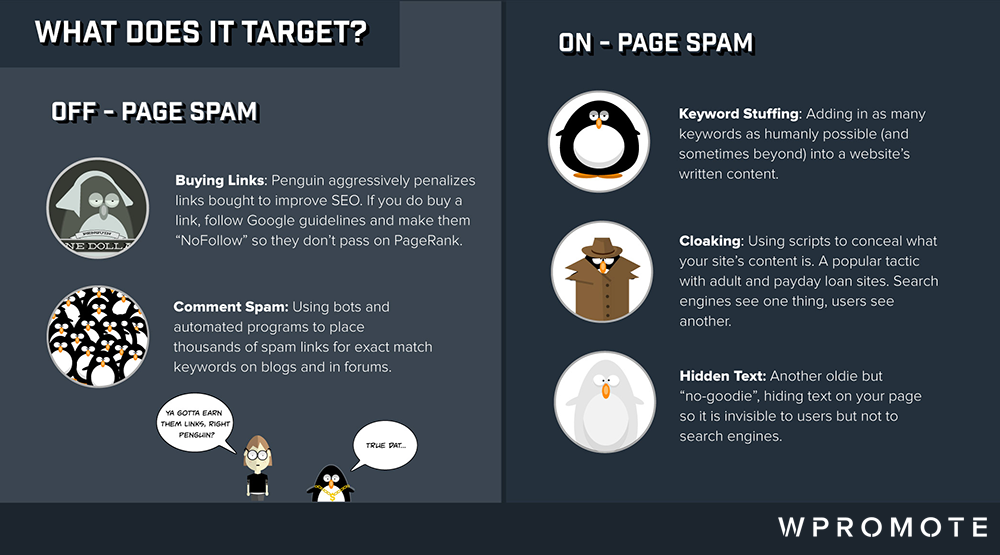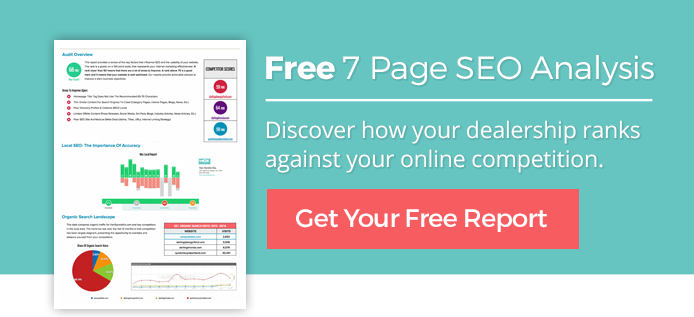How To Beat Google Possum and Penguin 4.0 Before Your Dealership Loses Rankings
Have you checked your site’s organic and local rankings lately? If you haven’t heard, Google rolled out 2 major updates in September striving to filter out spam-ridden websites, and they can have big impacts on your dealership’s position in Google. Here’s what you need to know:
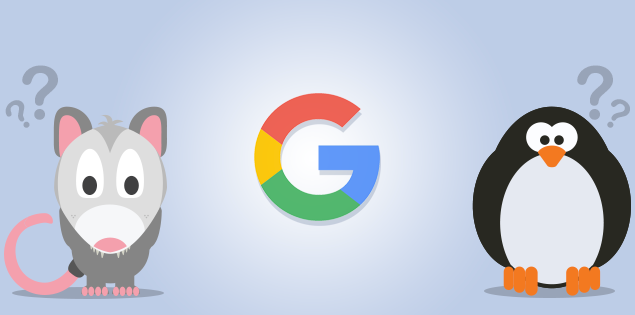
Google’s Painstakingly P-Named Updates: Possum & Penguin 4.0
On September 1, Google introduced a local Search Results filter nicknamed Possum, and it’s likely to have changed your dealership’s Google Maps listings (especially if you have multiple rooftops).
Next, Google Penguin 4.0 (released September 23) is Google’s organic link spam algorithm, designed to crack down on any dealership sites that are falsely exaggerating links in an attempt to rank higher.
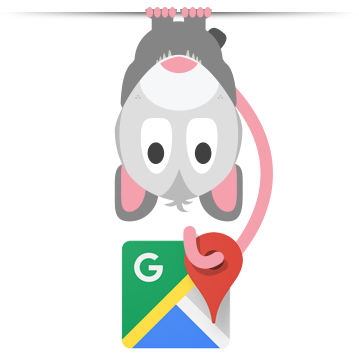
Google Possum: A New Local Search Filter That Loves Unique Listings
Possum isn’t penalizing dealership listings (or preventing them from ranking), but Possum is picking favorites based on relevancy, making some postings hide or “play possum” (hence the name).
Therefore, it’s important to check how your dealership is showing up in Google Map Listings, and adjust accordingly!
Dealerships with multiple listings are being aggressively filtered
When deciding what Local Packs to show (the 3 map results that appear when you search for a business on Google), Google looks at business names, addresses, phone numbers, and website domains, and then filters out any duplicates.
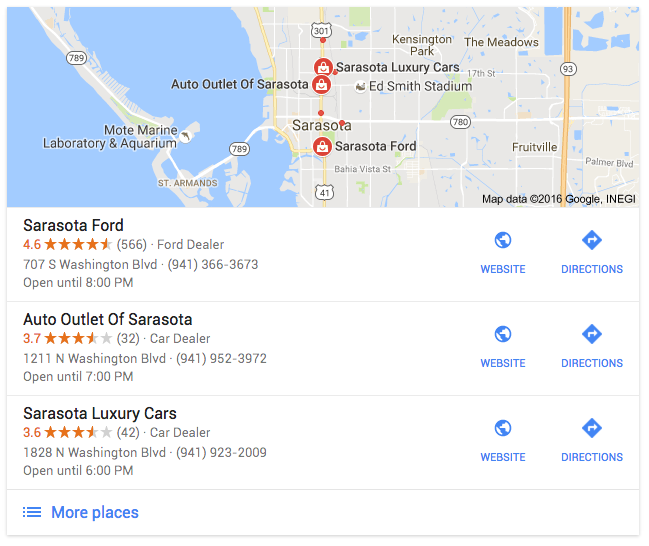
While it’s always done this, Possum just made the filter ultra-aggressive, which can be a big problem for dealers with multiple rooftops.
Though it makes sense that Google would hide separate listings of the same business, (you wouldn’t want the same office listed 5 times when scouting out a new chiropractor), it means you need to take a closer look at how your dealership is being listed.
Verify each of your listings has brand-specific categories in Google My Business, and check that each dealership has unique NAPs (name, address, and phone number) to make sure you’re not providing conflicting data.
Possum extends beyond city limits
The distance between a user and your dealership has always mattered, but with the Possum update, it has become stricter and less defined by state borders.
Before, when someone would search “dealership in Sarasota,” dealers located outside of the physical border of Sarasota would not show in local results. Technically, Google wouldn’t recognize them belonging to any city.
But now, businesses that fall outside physical city limits are seeing massive spikes in rankings.
Possum is more keywords-focused than before
Even the slightest keyword variations in the user’s search query can change the results they see.
For example, below is the difference between “toyota atlanta dealer” and “toyota atlanta dealer ga”.
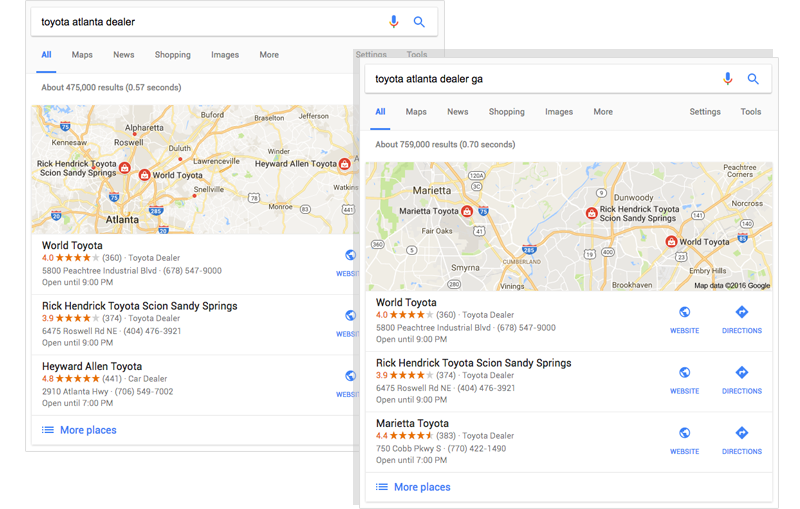
Possum is all about relevance, so it’s looking for keywords that will help the user find exactly what they’re looking for. Searching “Honda dealership service” will most likely show the dealership that has reviews about the dealer’s service department on their site, while hiding the listing that is lacking them.
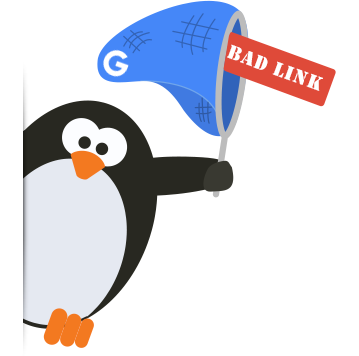
Google Penguin 4.0 Update: The Spam Catcher of Dealership Organic Search
While we found that dealerships haven’t experienced as much of a change with the Penguin update (organic) compared to the Possum update (local), it’s important to understand what Penguin is looking to punish and why, and how to fix your site if it has been affected.
What does Penguin do?
Google’s Penguin is an algorithm designed to penalize sites that are using spam to “game” Google’s search results. Penguin was introduced in 2012, and sites that were caught received major dips in their rankings.
Penguin goes after websites that have Off-Page Spam like fake comments and bought links, and On-Page Spam like keyword stuffing and hidden text.
Penguin 4.0’s site penalties are a little more lenient
Before this update, Penguin was pretty ruthless: entire dealer sites were ranked lower if spam was detected, and they couldn’t be “fixed” other than through a manual Google update.
Now that Google has deemed Penguin 4.0 “more granular,” only specific sections or categories of sites receive a penalty.
So if your dealership’s blog is harboring a bunch of spammy backlinks, but your website isn’t, only your blog will suffer a drop in the search results (at least, that’s what Google spokespersons are hinting).
Also new with Penguin 4.0 is that ranking recovery—or ruin—happens in real-time.
Rather than needing to wait for an update, recovery from decreases in rankings takes hours or days rather than weeks or months. This also means that bad or inauthentic links are being exposed and debunked much more quickly.
How your dealership can beat Penguin 4.0:
If your site was penalized from Penguin’s previous updates and you made the necessary changes, you should see that your rankings are climbing again. (Best case.)
If not, it’s important to re-evaluate your content and backlinks. Avoid spammy links and to instead build links that are highly relevant and valuable for vehicle shoppers.
(Is your dealership’s site still trying to regain status in the SRP? Check out this awesome infographic by Wpromote, “The Survivor’s Guide To The Google Penguin”!)
To avoid any additional penalties, it’s important to use appropriate anchor text, while surrounding links with valuable and well-written content.
Remember: SEO will never be “dead.” Google’s constant algorithm updates to both organic and local search attest to just that!
Enjoy this article? Subscribe to our blog to receive our latest articles, tips for your dealership, and more.

